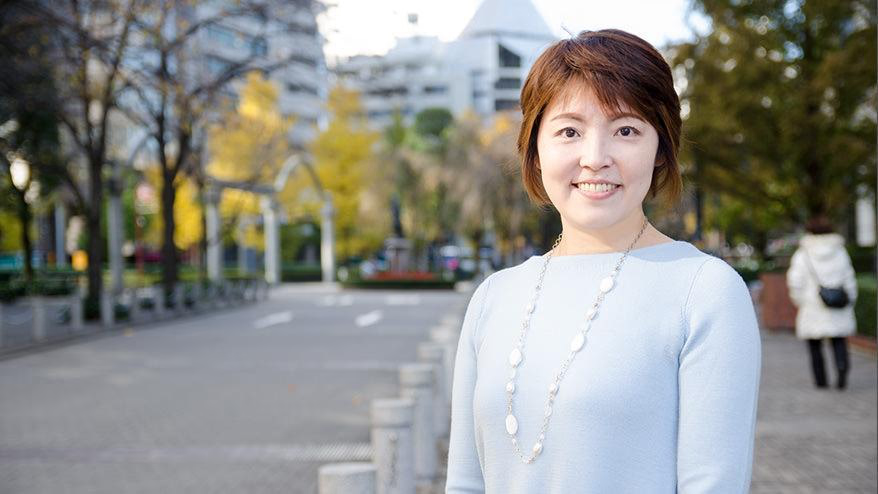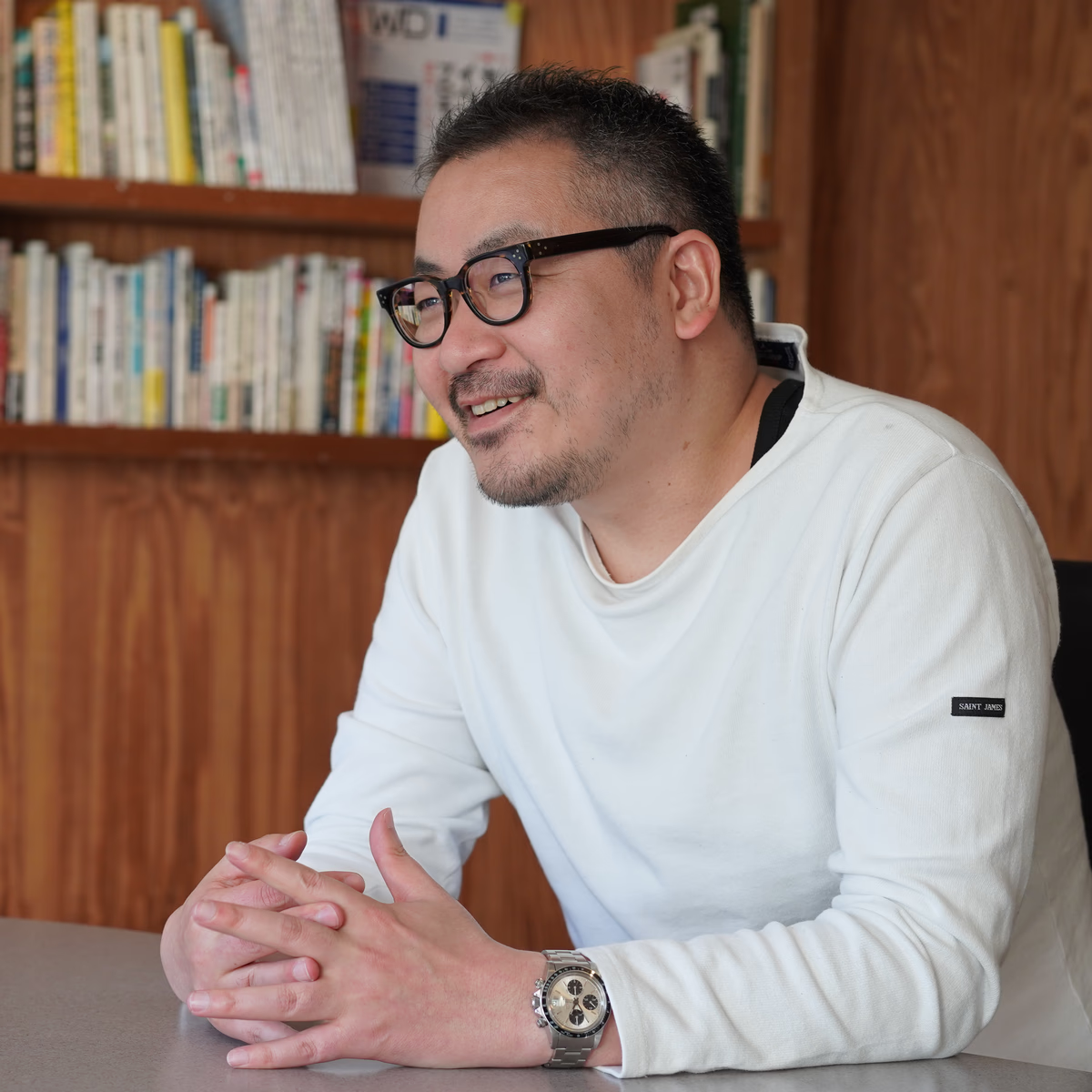Hello. I'm Tatsuta, the head of the marketing department.
Today I would like to introduce you to Hideno Okuyama, the head of the sales department.
She continues to stand out even at Monosus, where there are many female managers.
Although he was a former subordinate of the author, he has been with Monosus longer than I have and is a little older.
As head of the sales department, Okuyama is at the forefront of Coding Factory and Monosus as a whole, but the company has undergone many changes over the past few years to get to where it is today.
Looking back, I started out as a temporary staff member in charge of front desk and administrative work at a call center.
She was not affected by the ups and downs of work, but instead cheerfully soothed the team members, completed the assigned tasks and left work on time. After the holidays, she brought homemade bread she had baked at home and shared it with the team members. She was truly a symbol of peace.
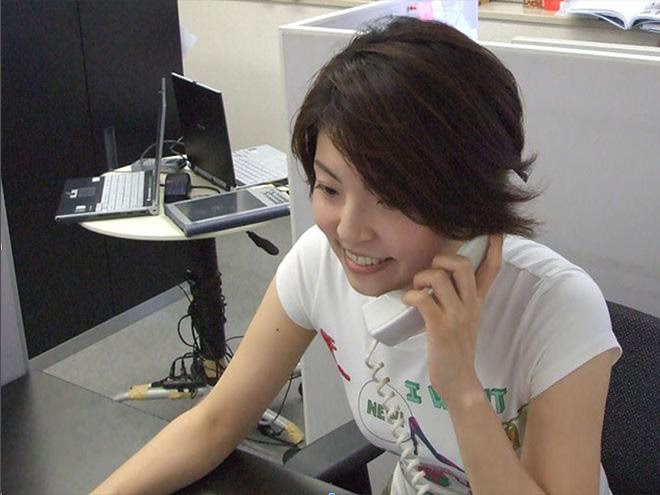
Okuyama when he was working at the call center
That's it.
This time, I would like to look back on Okuyama's journey up to the present day.
Before taking up the position of salesperson, he continued to "attract" all kinds of work
As mentioned above, Okuyama was a dispatched staff member working at a call center and handling general administrative tasks.
From then on, I was given more and more work.
1. Absorb website quality check tasks...
This was shortly after Coding Factory was launched. The service was still in its infancy, and the quality was not stable. The call center that Okuyama was in charge of was inbound (responding to incoming calls), so there was time spent waiting for calls. We decided to use that time to check the quality of the web pages that were created, and he began to do the checking work.
↓
2. Attract more new sales by making phone appointments...
It was around the time that I started doing the checking work and the quality of the coding factory started to improve. It was a time when we had to work hard on new sales. However, we didn't have enough manpower to make phone appointments. "Maybe Mr. Okuyama can do it," I thought, and in between the above work, I started doing phone appointments for new sales.
↓
3. Attract more direction work for small projects...
Once we had a good idea of the quality and sales, the issue of improving productivity came up. When we reviewed our work, we realized that the burden of directing small-scale projects was falling on the coders more than we had expected. We decided to experimentally take on directing tasks to see if we could reduce that burden even a little.
↓
4. From temporary staff to part-time work
Okuyama had been a central player in the call center, website quality checks, phone appointments, and direction work for a long time. After much coordination and discussion, he was finally promoted from a temporary staff member to a part-time employee.
By this time, none of the members thought that Okuyama was a temporary staff member.
↓
5. Appointed as team leader for quality checks on ultra-large-scale projects, responsible for managing more than 10 people
We have received an order for a project with over 13,000 pages, the largest project in Coding Factory's history. This is a major project that the entire company will work on together.
Monosus assigns work to the right people in the right positions, regardless of employment status. Okuyama, a part-time employee, has been appointed leader of the check team, which is an important part of the company.
It was an incredibly tough three months, with deadlines looming day and night and leaving him mentally and physically exhausted, but Okuyama saw it through without giving up.
And the biggest change
It seems like things have changed quite a bit up to this point, but now another big change is coming.
We were just about to feel relieved after the delivery of the super-large project mentioned above. There was a major organizational change across the company. As a result, we had to quickly hire a sales representative for Coding Factory.
We have placed recruitment ads in various recruitment media and conducted recruitment activities, but it has not been going well.
While thinking about how to hire the right people, I decided to organize my thoughts and wrote down on paper the type of person I was looking for.
- We are looking for someone who can share the vision and goals of Coding Factory.
- In order to grow further, I would like someone who can take on new challenges.
- This is a job that involves contact with many people, so it is best to have someone full of vitality.
- As a salesperson, you need leadership skills to get people involved both inside and outside the company.
- Not everything will go well, so you need to be able to withstand stress.
- We want someone who fits the Monosus corporate culture
- Must have at least basic knowledge of web site production, preferably with industry experience
That's what I think as I look at this note.
``There's no one like that.''
However, there is no time to wait.
"How can I find it...
Maybe a little compromise is necessary...
Hmm..."
As I was worrying about this, my eye suddenly fell on the person sitting next to me, who was happily making a phone appointment.
Yes, it's Okuyama.
"Yes, I've found the perfect person here!"
My boss at the time seemed to be thinking the same thing, and while wondering why he hadn't noticed this before, he invited Okuyama to try sales.
After several discussions, Sales Okuyama was born.
This led to my later appointment as sales team leader and then to my current position as head of the sales department.
The unconscious Okuyama-style sales that created the foundation of the sales team
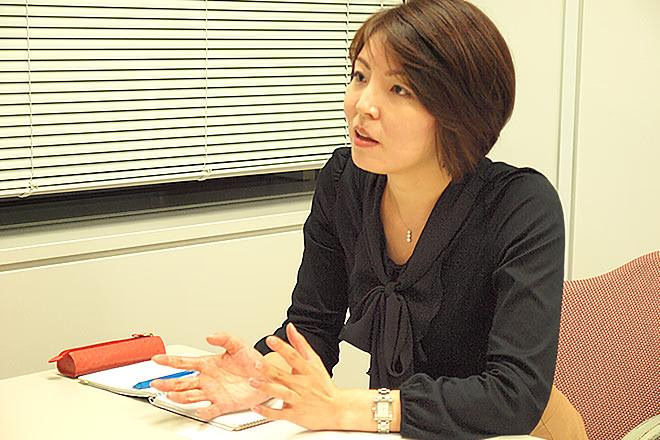
I regularly accompanied Okuyama on sales calls when he was a first-year salesperson to teach him sales techniques.
One day, the salesperson was consulting about a specific project. When consulting about a project, it is important for a salesperson to understand the budget of the project. The author asks questions while paying attention to the timing and the way of asking.
However, Okuyama's response was completely different. He asked questions at a timing that made the audience think, "Huh? Are you asking me that now?", and the audience answered in a natural way.
When I saw this, I was surprised and thought, "There's another way to do it like this," and at the same time, I decided to stop giving detailed instructions on sales methods.
I thought that if I taught him my own way in a weird way, it might kill Okuyama's strengths.
We decided to teach them only the basics of Coding Factory's sales, such as how to introduce the company and how to create quotes, and leave them the freedom to think and act on their own.
This style of teaching only the basics and a framework for thinking, and then having students think and act on their own, has also become the training policy for our sales team.
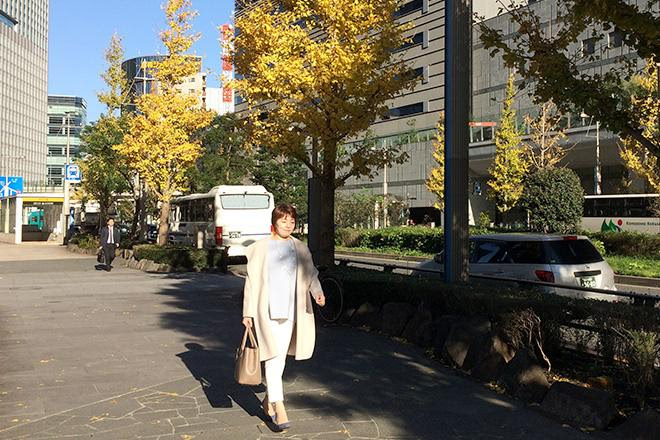
Okuyama is heading to a client's office. His leather bag is always quite heavy with his laptop and paper documents, but he never puts it on his shoulder, but always holds it in his hand. He also pays attention to the colors of his clothes so that his clients can feel as relaxed as possible.
As with the example above, I believe Okuyama is a sales genius.
It seems he isn't aware of it himself.
The Okuyama style of sales has two faces that coexist beautifully.
One of them has a face like that of a wild beast, pushing and pounding.
The other is her angelic face, caring for customers and members.
The balance is exquisite.
Let me tell you about one episode that had a really wild feel to it.
Coding Factory holds seminars on a regular basis. Generally, we host them ourselves, but we have once given a seminar as a guest speaker at a seminar hosted by another company.
Because the seminar is being hosted by another company, we are unable to provide a list of participants due to privacy concerns. The organizers said, "We can't provide you with a list, but you are welcome to exchange business cards on the day of the seminar."
For sales, the seminar participant list is an important resource.
At that time, the sales team consisted of Okuyama and another woman named Katori Reimi , who grew up watching Okuyama's ideology and sat next to him.
The author gave the following riposte to these two men:
"The seminar participant list is extremely important for sales. Please exchange business cards with everyone."
And then, the day of the seminar arrived.
When the doors opened, customers began to trickle in.
However, for some reason, there was a line at the entrance to the venue.
The reception desk was in the elevator hall, so there was no way there would be a line at the entrance to the venue. I wondered why, and when I went to take a look, I saw Okuyama and Katori standing on either side of the entrance. They were blocking people from entering, exchanging business cards in order, and letting people enter after exchanging business cards.
His appearance is exactly like that of the wind god and thunder god.
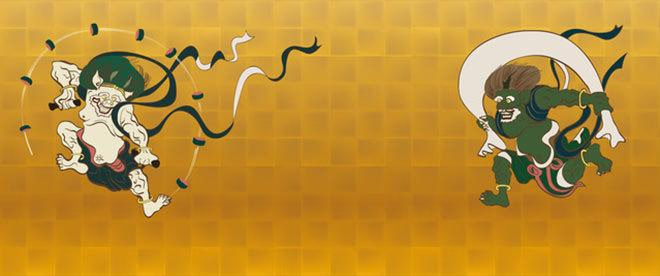
I was nervous that the organizers would get angry with me.
However, because it was done so naturally, it gave the impression that this was normal and was tolerated.
I was surprised, shocked, and amused at the thought of them never coming up with that idea, but at the same time, I was also impressed by how they thought up what to do and put it into action. It was an episode that made me feel that "people who enjoy thinking for themselves and taking action are the ones who will grow."
Of course, I managed to get business cards of all the participants.
The other angel's face will be too long to explain, so I will skip it. If you are interested, please feel free to consult with Okuyama about the project.
"I'll talk to Okku about it first, okay?"
So far, we have looked back at Okuyama's career.
Have I conveyed that you are always challenging yourself with new things?
In fact, Okuyama loves taking on new challenges.
Or rather, I don't like being in a rut.
However, despite that, I tend to be a bit anxious and a bit of a coward.
Every time I suggest something new and ask, "Why don't you try this?" I end up feeling anxious and wondering, "Can I do it?" and "Will it be okay?"
And at times like that, there is one thing that always comes back to me.
That's the title of this chapter, "Is it okay if I consult with Okku first?"
Okku means Okuyama's master. We call our master Okku.
At first, I had to suppress the urge to say, "You're an OK kid too," when I received this response every time.
After hearing it many times, I began to hear these words as a starting point to sort out my feelings of "I'm interested, I want to try, but I wonder if I'm really up to it?" and to make up my mind.
I believe it is because I have struggled, consulted with others, and made up my mind so many times that I have been able to achieve results in each of my jobs.
Okuyama continues to change in this way, but there is one thing that never changes.
This is Okuyama's true spirit: "I love being useful to others, and it gives me courage."
From the time he started working in sales until now, there is one thing that Okuyama has always said.
"I want to create as many people as possible who can rely on me by name."
Even as we go through constant change, this spirit remains the same.
Looking back on it like this, I can't help but feel that Okuyama's growth trajectory is the same as that of Coding Factory and Monosus.
This trajectory, which may be distorted but has always been one of upward mobility, is unique to Monosus, and seems to be Monosus itself.
Even now, as a department manager, Okuyama continues to take on new challenges.
I look forward to seeing you chart a new path of growth for yourself and your subordinates.
